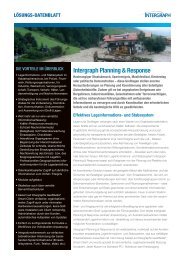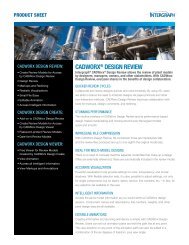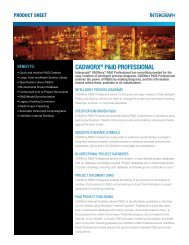Read the Nuclear Industry Spotlight - Intergraph
Read the Nuclear Industry Spotlight - Intergraph
Read the Nuclear Industry Spotlight - Intergraph
Create successful ePaper yourself
Turn your PDF publications into a flip-book with our unique Google optimized e-Paper software.
for meeting or beating cost and schedule estimates<br />
on all of its current power plant and nuclear component<br />
replacement projects. Utilities also like <strong>the</strong> fact<br />
that Washington Group has an in-house cadre of<br />
expertise to complete all phases of licensing, design,<br />
engineering and construction. As a result of <strong>the</strong><br />
varied project experiences of <strong>the</strong> company’s combined<br />
business units, Washington Group employs<br />
significantly more high-level nuclear experts than<br />
any o<strong>the</strong>r engineering and construction company.<br />
Despite <strong>the</strong> decades-long downturn in <strong>the</strong> industry,<br />
<strong>the</strong> company is already fully staffed to design, engineer<br />
and build new nuclear power plants.<br />
“One of our differentiators in this marketplace<br />
is, ‘If you start with us, you can finish with us,’”<br />
Nash said. This has been a successful selling point<br />
in o<strong>the</strong>r power projects. Utilities like <strong>the</strong> fact that<br />
Washington Group business units operate as one<br />
company, with seamless transition between project<br />
phases and a demonstrated ability to synergistically<br />
leverage <strong>the</strong> key competencies of each unit.<br />
While <strong>the</strong> current U.S. administration and Congress<br />
clearly want to create incentives for nuclear<br />
development, unresolved political issues may<br />
still have <strong>the</strong> potential to slow or halt progress.<br />
The foremost concerns relate to spent nuclear<br />
fuel, which continues to be stored at each plant<br />
site. The waste is nei<strong>the</strong>r bulky nor unstable, but<br />
storage solutions must contain <strong>the</strong> radioactivity for<br />
hundreds of thousands of years. For security and<br />
long-term storage reasons, <strong>the</strong> NRC had planned<br />
to transfer all spent fuel to a permanent, secure<br />
waste facility at Yucca Mountain, Nevada, starting<br />
in 1998. However, Nevada politicians oppose<br />
<strong>the</strong> site and <strong>the</strong> facility remains unfinished and<br />
entangled in political battles that have no clear<br />
timetable for resolution.<br />
Many utilities do not believe <strong>the</strong> unresolved spent<br />
fuel issue will have <strong>the</strong> power to delay <strong>the</strong>ir proposed<br />
new plants, and <strong>the</strong> Energy Policy Act gives<br />
<strong>the</strong> DOE only one year to deliver a long-term, highlevel<br />
nuclear waste plan to Congress. However, <strong>the</strong><br />
utilities’ comfort level could change if <strong>the</strong> public<br />
does not view current technologies as safe.<br />
“It is also still too early to gauge <strong>the</strong> true level<br />
of public support for new plants,” said Cynthia<br />
Stinger, Washington Group’s vice president of<br />
government affairs.<br />
Although some polls show nearly 70 percent of <strong>the</strong><br />
public supports nuclear power expansion, Stinger<br />
said, “We’re looking at things from <strong>the</strong> 30,000-<br />
foot level right now.” She believes <strong>the</strong> real test will<br />
come when utilities begin to submit formal license<br />
applications for specific locations.<br />
Today’s Americans have been inundated with<br />
images of terrorist attacks and hurricane evacuations,<br />
so <strong>the</strong>re is no telling how <strong>the</strong>y will react to<br />
discussion of emergency-evacuation plans in <strong>the</strong>ir<br />
own communities as a response to a potential<br />
radioactive release.<br />
“But if consumers are paying $4 or $5 per gallon<br />
of gas, politicians will feel <strong>the</strong> heat to make things<br />
happen,” said Stinger.<br />
The continued nuclear renaissance also depends<br />
on an essentially perfect safety record at current<br />
power plants. An irony of <strong>the</strong> accident at<br />
<strong>the</strong> Three Mile Island nuclear power plant in<br />
Pennsylvania in 1979 is that <strong>the</strong> only fallout was<br />
political – <strong>the</strong> safety systems actually contained <strong>the</strong><br />
release of radiation. Stinger said that politicians, if<br />
not <strong>the</strong> public, are now generally comfortable with<br />
<strong>the</strong> safety of today’s nuclear plants, which have<br />
multiple redundant safety systems and backups to<br />
ensure that a reactor is kept cool even if primary<br />
and secondary systems fail.<br />
Whenever new reactors are built, <strong>the</strong>y will be in<br />
a new league of safety features. Most important,<br />
<strong>the</strong>se generation IV designs are “passive nuclear<br />
plants,” which are even safer because <strong>the</strong>y require<br />
no electrical systems or pumps to cool <strong>the</strong> reactor<br />
– only a water supply and gravity.<br />
While Washington Group gears up to create new<br />
nuclear power plants, <strong>the</strong>re is still big business<br />
among <strong>the</strong> 103 nuclear plants currently operating.<br />
Until about 10 years ago, <strong>the</strong> conventional wisdom<br />
was that <strong>the</strong> big money would be in decommissioning<br />
and decontaminating <strong>the</strong> nation’s aging<br />
fleet. Instead, <strong>the</strong> revenue now comes from keeping<br />
those plants running.<br />
“Deregulation made <strong>the</strong>se very valuable economic<br />
assets for <strong>the</strong> utilities,” said Joseph Ruggiero,<br />
Washington Group’s director of nuclear services.<br />
He said <strong>the</strong> original 40-year operating<br />
licenses for <strong>the</strong>se plants have been upgraded to<br />
60 years in dozens of applications to <strong>the</strong> NRC.<br />
“There is still a large amount of work available<br />
from <strong>the</strong> maintenance and upgrade of <strong>the</strong>se<br />
nuclear plants,” he said. Washington Group performs<br />
a sizable share of <strong>the</strong> major engineering and<br />
upgrade work on existing plants. Gross predicts<br />
that both this market and <strong>the</strong> company’s market<br />
share will escalate.<br />
Lou Pardi, president of <strong>the</strong> Power Business Unit,<br />
said that Washington Group is pushing for legal<br />
changes that will help <strong>the</strong> company enter <strong>the</strong> growing,<br />
lucrative overseas nuclear power plant market<br />
as well. Under current international law, should an<br />
accident occur at a foreign nuclear plant that was<br />
engineered or constructed by Washington Group,<br />
<strong>the</strong> company would have no protection from class<br />
action suits in American courts. Washington Group<br />
belongs to a consortium that is pressing for an<br />
international convention that will provide protections<br />
similar to <strong>the</strong> U.S. Price-Anderson Act.<br />
“The probabilities of an accident are extremely<br />
remote, but <strong>the</strong> consequences to companies like<br />
ours are very high,” Pardi said. “We don’t want to<br />
get into this market until <strong>the</strong>se issues are resolved.”<br />
Over <strong>the</strong> long term, nuclear power is far cheaper<br />
to produce per kilowatt than o<strong>the</strong>r fuels, but few<br />
utilities can afford to tie up billions of dollars in<br />
capital for a decade before <strong>the</strong> generators start<br />
running. Utilities in <strong>the</strong> United States and abroad<br />
still have a high interest in traditional fossil fuel<br />
power plants – particularly coal – and increased<br />
power demands will help <strong>the</strong> Power Business Unit<br />
continue to grow even if nuclear energy again falls<br />
out of vogue.<br />
“There has historically been a rotation of technologies<br />
as one fuel becomes favored above ano<strong>the</strong>r,”<br />
Nash said. “Our strategy is to be diverse: gas, coal,<br />
hydroelectric and nuclear. We want to do a mix in<br />
services business, new generation, maintenance<br />
and engineering, <strong>the</strong> upfront assessing of capital<br />
projects, a lot of retrofit, modification and facilities<br />
work. A diverse business is a strong business.”<br />
As energy needs grow throughout <strong>the</strong> world,<br />
Washington Group will continue to offer a full<br />
spectrum of power and nuclear services. “We’re<br />
keeping our engineering and construction pool as<br />
deep and broad as possible,” Nash said.<br />
<strong>Nuclear</strong> <strong>Industry</strong><br />
Insight<br />
5

















